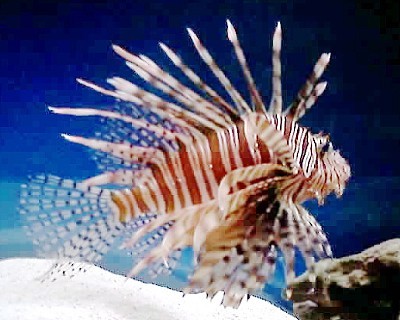They've gotten a little better about bringing in species into new countries and there has been some success in control. Given the Lionfish's main defense is its spines, it shouldn't be that impossible to exterpate it from at least local reefs,but it's here to stay. It's a slow moving fish that hangs out in the littoral zones so it's not exactly elusive.
One of my first research papers in Ecology was on feral pigs in the US and it's finally getting a lot more attention including a reality show on hunting them. You can control many invasives, but one thing that makes them invasive is they tend to have short breeding cycles and it can take only a few to get a population going. There are prob big populations of Lionfisn in the Silver Banks and wiping them out from such a big area would be next to impossible. I think they can be manage for individual reefs esp where there are also spear fishermen.
As I've posted, they should put a bounty on these guys, even if it's just 10 pesos each. A single lionfish does a hell of a lot more than ten pesos worth of damage in a year. As humans, we tend to pretty good at wiping out species on our own. In one article I read, I heard that 25% of a lionfish population needs to be killed every month just to keep a population from growing. I think this could be done with fishing rallies where you have contests to see who can get the most by spear in a three hour period and then have the contests in rotation for the various fishing zones. You have to hit pest species HARD to have any impact. It's better to try and wipe out 80% of a population twice a year than than an ongoing campaign that takes out only 10-20% per month. In Ecology, this is called additive vs compensatory mortality.
I might add that this "hit them hard" mentality also works with rats and other vermin. If the DR started a program that had everyone put out rat poison and traps on just the first of the month, the control would be better. A week long program once a few times a year would be even better.


